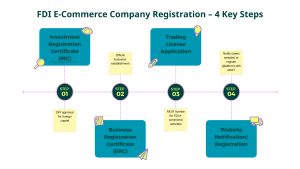- If you have any questions, please contact us!
- +84 965 624 065
- info@greennrj.com.vn

Should You Establish a Company or Use a Cosmetic Notification Holder in Vietnam? 4 Important Factors to Know
May 9, 2025
Temporary Residence Card in Vietnam – Avoid Mistakes with Full Guide, Requirements & Application (2025)
May 10, 2025How to Establish a Foreign-Invested E-Commerce Company in Vietnam: 7 Essential Steps for Success
1. Introduction
Establish a Foreign-Invested E-Commerce Company in Vietnam is now one of the most strategic moves for global businesses looking to capture this rapidly growing digital market. Vietnam has become a booming e-commerce hub thanks to its growing middle class and increasing internet penetration. For foreign investors, understanding the legal framework and procedural requirements is essential.
2. Overview of Legal Framework
Foreign investment in e-commerce in Vietnam is governed by a set of key legal instruments:
-
Law on Investment 2020 (amended by Law No. 57/2024/QH15): Regulates foreign investors and forms of investment. Key changes take effect from January 15, 2025, with some from July 1, 2025.
-
Law on Enterprises 2020: Governs the establishment and operation of all enterprises, including foreign-owned e-commerce businesses.
-
Decree No. 09/2018/ND-CP: Defines trading rights for foreign-invested enterprises (FIEs).
-
Decree No. 52/2013/ND-CP (amended by Decree No. 85/2021/ND-CP): Provides the legal basis for e-commerce activities in Vietnam.
-
Circular No. 47/2014/TT-BCT (amended by Circulars No. 21/2018/TT-BCT and 01/2022/TT-BCT): Guides e-commerce website registration with the Ministry of Industry and Trade (MOIT).
These regulations are essential for any foreign investor looking to legally operate an e-commerce business in Vietnam.
3. Types of E-Commerce Business Activities
Foreign investors planning to set up an e-commerce business in Vietnam can engage in several types of online commercial activities. Each e-commerce model comes with specific licensing requirements and regulatory procedures, especially if third-party transactions are involved.
- Business-to-Consumer (B2C) E-Commerce in Vietnam: Foreign-owned companies can operate B2C platforms to sell goods and services directly to end-users through online websites or mobile applications. This model is common for retailers and service providers targeting individual consumers.
- Business-to-Business (B2B) E-Commerce: This model involves providing a digital environment where businesses sell to other businesses, typically in bulk or via wholesale arrangements. It includes supply chain platforms, enterprise software, or industry-specific marketplaces.
- Multi-Seller Marketplace Operation (Online Platform Model): Foreign companies may establish and operate a multi-vendor e-commerce platform in Vietnam, enabling third-party sellers to offer goods or services. Operators must comply with marketplace licensing regulations and data protection laws.
- Online Service Providers (Digital Platforms and SaaS): Foreign-invested enterprises may offer online services such as Software-as-a-Service (SaaS) platforms, online booking systems, digital subscriptions, or education platforms. Depending on the service, additional approvals from Vietnamese authorities may be needed.
Each e-commerce activity may require different licenses and compliance procedures, especially for businesses that facilitate transactions on behalf of third parties, such as marketplaces or payment gateways.
4. Business Line Code and Ownership Rules
Business Line Code
Foreign investors must register appropriate business lines with the Vietnamese authorities. For e-commerce and related activities, the common codes include:
| No. | Industry Name | Industry Code | Legal Basis | |
|---|---|---|---|---|
| 1 |
|
4791 | Article 35 of Decree 52/2013/ND-CP as amended by Decree No. 85/2021/ND-CP | |
| 2 |
|
6209 | ||
| 3 |
|
6399 | ||
| 4 |
|
6312 | Article 6, 27 of Decree 72/2013/ND-CP | |
| 5 | Advertising | 7310 | ||
| 6 | Market research and public opinion polling | 7320 | ||
| 7 | Activities of call centres | 8220 | ||
| 8 | Organization of conventions and trade shows | 8230 | ||
| 9 |
|
9329 | Article 34 of Decree 72/2013/ND-CP |
Can Foreign Investors Own 100%?
Yes, foreign investors are permitted to own up to 100% of the charter capital in most e-commerce businesses in Vietnam. This aligns with Vietnam’s WTO commitments and is supported by various Free Trade Agreements (FTAs), such as CPTPP and EVFTA, which allow full foreign ownership in most sectors, including online retail and e-commerce.
- Foreign Ownership in E-Commerce Business in Vietnam: According to Vietnam’s investment policies, foreign investors can fully own e-commerce businesses, especially those operating online retail platforms or other digital services. This provides significant opportunities for foreign enterprises to enter and expand in the Vietnamese e-commerce market.
- Exceptions to 100% Ownership: However, certain sectors that require conditional market access, such as logistics, advertising, or other regulated industries, may have restrictions on foreign ownership. Investors in these areas should carefully review specific regulations and obtain the necessary permits.
5. Key Conditions and Requirements
To legally operate a foreign-invested e-commerce business in Vietnam, investors must meet specific legal requirements and follow regulatory guidelines. Below are the key conditions for foreign companies seeking to set up an e-commerce business in Vietnam:
- Compliance with WTO and FTAs Commitments: Foreign-invested e-commerce companies must align their business activities with Vietnam’s commitments under the World Trade Organization (WTO) and relevant Free Trade Agreements (FTAs), such as the CPTPP and EVFTA. This ensures that the business complies with international trade regulations.
- Business Scope and Permitted Activities: The company’s operations must fall within permitted business activities. Certain industries, like publishing, pharmaceuticals, or telecommunications, may require additional licenses or face restricted operations for foreign investors. It is essential to verify the specific industry regulations for your e-commerce business.
- Vietnamese Partner Requirement: In some cases, especially in sectors such as advertising and logistics, foreign investors may need to partner with a Vietnamese entity. This legal requirement ensures compliance with market access regulations for specific industries.
- Capital Contribution: Foreign investors must fulfill the capital contribution requirements outlined in their Investment Registration Certificate (IRC). While there is no fixed minimum capital, the amount should reflect the scale of operations and be sufficient to cover business expenses. Investors typically have 90 days from the issuance of the Enterprise Registration Certificate (ERC) to make the capital contribution.
- Business Location: A physical business address is mandatory for registering an e-commerce company. Virtual offices or shared workspaces may not be acceptable for certain legal registrations, so it is essential to ensure a compliant business location.
- Appointment of a Legal Representative: A legal representative must be appointed and reside in Vietnam. This person is responsible for ensuring the company’s legal compliance and handling regulatory obligations on behalf of the business.
6. Step-by-Step Process to Set Up an E-Commerce Company

🔹 Step 01: Obtain the Investment Registration Certificate (IRC)
Purpose: The Investment Registration Certificate (IRC) is essential for recording foreign capital investment in Vietnam. It is the first step before registering your e-commerce company in Vietnam.
Authority: Department of Planning and Investment (DPI) in the province where the company will operate.
Process:
-
Prepare an investment proposal detailing business scope, capital structure, and the e-commerce business model.
-
Submit documents demonstrating the investor’s legal status, financial capacity, and intended business activities.
-
DPI evaluates whether the investment aligns with Vietnam’s development goals and international trade commitments.
Outcome: The IRC authorizes the foreign capital contribution and allows the investor to establish an e-commerce business in Vietnam.
🔹 Step 02: Obtain the Enterprise Registration Certificate (ERC)
Purpose: The Enterprise Registration Certificate (ERC) officially recognizes your company as a legal entity in Vietnam.
Authority: Business Registration Office under the Department of Planning and Investment (DPI).
Process:
-
Submit an application with the company charter, business name, business address, and shareholder information.
-
Define the company’s management structure and appoint a legal representative.
-
Ensure the registered office meets local real estate requirements.
Outcome: The issuance of the ERC marks your company’s legal existence in Vietnam’s business registry.
🔹 Step 03: Apply for a Trading License (if applicable)
Purpose: Foreign-invested companies in the retail sector or conducting e-commerce trading need a trading license to legally operate in Vietnam.
Authority: Department of Industry and Trade (DOIT) in the province or city where your company is registered.
When Required:
-
Mandatory for companies engaging in online retail of physical goods.
-
Exempt for companies providing digital services (e.g., SaaS platforms, software) or those operating B2B e-commerce platforms.
Process:
-
Apply after obtaining the IRC and ERC.
-
Submit a detailed plan explaining the goods to be sold, website operations, logistics model, and delivery process.
-
DOIT evaluates the application for market impact, consumer protection, and compliance with e-commerce laws in Vietnam.
Outcome: Once approved, your company will be legally authorized to conduct online retail of goods in Vietnam.
🔹 Step 04: Notify/Register Your E-Commerce Website
Purpose: According to Vietnam’s e-commerce laws (Decree 52/2013/ND-CP, amended by Decree 85/2021/ND-CP), e-commerce businesses must register or notify their website based on the nature of their business operations.
Authority: Department of E-commerce and Digital Economy, Ministry of Industry and Trade (MOIT).
Types of Activities:
- Notification: Required for e-commerce websites that sell the company’s own goods or services.
- Registration: Required for e-commerce service platforms that allow third-party sellers or service providers to operate (e.g., multi-vendor marketplaces, online booking portals).
Process:
-
Create an account on the MOIT e-commerce portal (online.gov.vn).
-
Submit required documents, including:
-
Enterprise Registration Certificate (ERC).
-
Website domain ownership proof.
-
Business activity details and terms of service.
-
- Await confirmation from the MOIT.
Outcome: You will receive either:
-
A notification confirmation for e-commerce websites selling your own goods or services.
-
A registration certificate for platforms that facilitate third-party e-commerce operations.
7. Frequently Asked Questions (FAQ)
Q1: Can foreign investors own 100% of an e-commerce business in Vietnam?
Yes, foreign ownership of up to 100% is permitted in most e-commerce sectors, subject to WTO and Vietnam’s local commitments.
Q2: How long does the entire setup process take?
Generally, it takes 30–45 working days, depending on the complexity of the business and the location of registration.
Q3: Is a physical office in Vietnam required?
Yes. A physical office lease or owned premises must be shown to register your business and receive licenses.
Q4: Is the Trading License mandatory for all e-commerce companies?
No. If your business only operates an online platform without direct retail activity, a Trading License may not be required. However, professional legal advice is recommended to confirm based on your specific business model.
Q5: Can the legal representative be a foreigner?
Yes. A foreigner can act as the legal representative, but they must reside in Vietnam and fulfill all legal obligations.
8. Green NRJ – Your Trusted Partner in Vietnam
At Green NRJ, we specialize in helping foreign investors establish e-commerce businesses in Vietnam smoothly and compliantly. Our experienced consultants assist with every step of the process, from legal setup to operational compliance.
✅ Our support includes:
- Pre-investment consultation and structure planning
- Full support with IRC and ERC applications
- Trading license consultation and application
- MOIT website notification or registration
- Address setup and office leasing support
👉 Let Green NRJ be your reliable partner in Vietnam. Contact us today to begin your e-commerce journey with clarity and confidence.
Related Articles:
- How to Start a Business in Vietnam: A Complete Guide for 2025
- Establishing a Representative Office in Vietnam: A Step-by-Step Guide for Foreign Companies
- How to Establish a Consulting Business in Vietnam – A Legal and Practical Guide (2025)
- How to Set Up a Construction Company in Vietnam (2025)
- How to Establish a Headhunting Company in Vietnam: A Complete Guide for Foreign Investors




